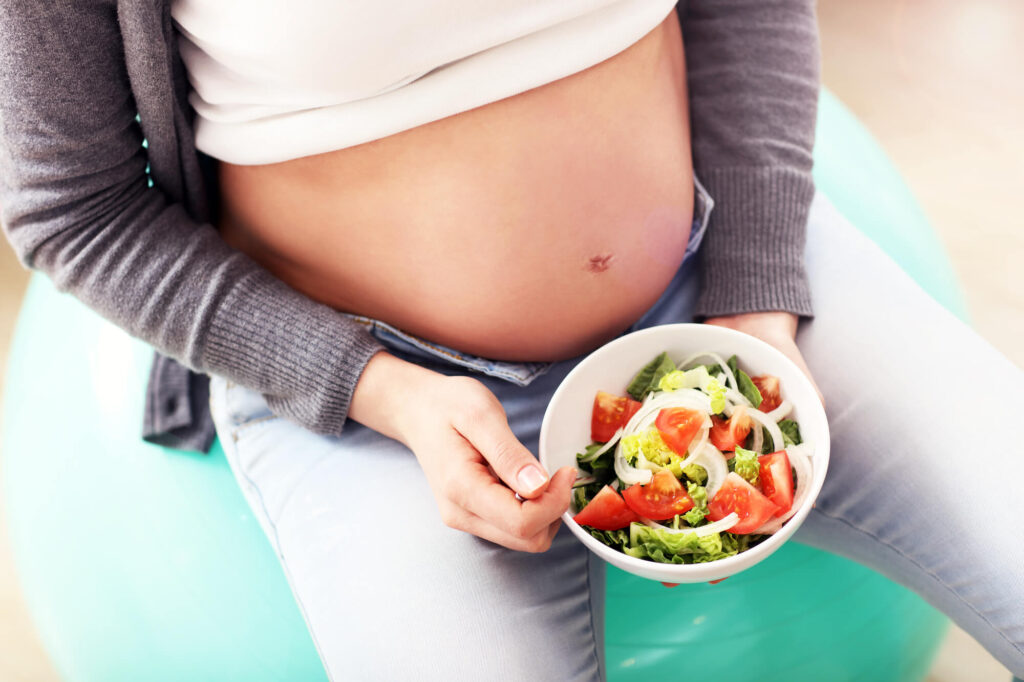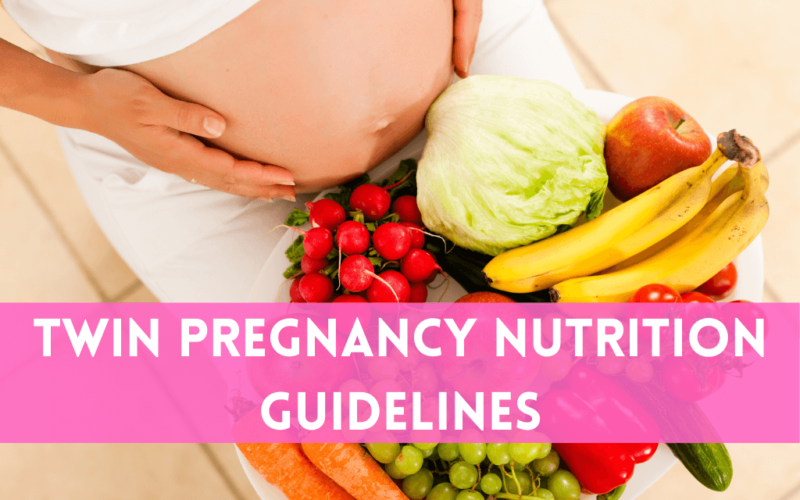As a parent of twins, your nutrition guidelines need to be detailed and well-established. Therefore it is useful to have thorough guidelines, expert comments, and detailed information on each and every nutrient you need to consume.
Some nutrients are essential during pregnancy, for example, folic acid, protein, and iron, these are necessary at every stage of pregnancy even before you get pregnant. However, some nutrients, like vitamin A, need to be taken with extra care and caution as they can cause a birth defect in your twins.
Therefore vitamin A is usually given to children after they are born. As a parent, your responsibility begins from the first day to have a good idea of what your body and your twins need in order to have healthy and safe babies.
This article focuses on the nutrition guidelines to follow, if you want to read about the diet I followed during pregnancy check out this article.
Calcium
Since you will be nurturing two little angels in your belly, you will need a proper amount of calcium for their development and growth. Calcium is one of the essential nutrients that help your kids build bones, muscles, and red blood cells.
The entire skeleton’s development depends on the amount of calcium you intake. And since you will be carrying two children, you will need more intake than parents with a single child. The input will depend on the rate of blood your fetus is taking in.
Usually, fetuses need more calcium in the last trimester since they form their teeth and have more significant development in their bones and skeleton at that time. In the first two trimesters, you will need 200 mg of calcium per day. In the last one, you will need about 600 mg per day, in addition to your daily calcium intake from food. From food and supplements, you need to intake about 2000-2500 mg per day.
To make the measurement clearer, four cups of milk will be enough to meet the daily requirement as one cup will contain about 300 mg. Milk is also considered to be the best-absorbed source of calcium which is 30%. Nondairy food is safe, however, make sure to check the calcium-containing amount so that you don’t intake less than you should.
Although supplements are needed to meet the daily requirement, they might cause some side effects such as gastrointestinal problems, bloating, etc. In order to minimize that keep the supplement intake within 500 mg at once. However, be careful not to cross the upper limit of calcium intake which is 2500 mg. And also, try to consume the calcium vitamin separately from other multivitamins containing iron.
Calorie
Twin pregnancy calorie requirement is different than singletons. Experts recommend increasing the dose to 300 calories per baby in the first trimester. In the second one, the dose goes up to 340 and in the last trimester, you need to take about 452 calories per baby.
So if you are carrying twins, just double the doses. However, instead of counting calories, doctors also recommend taking in as much as you can from healthy food sources. Healthy fruits, and vegetables, are good sources of calories instead of fast foods.
If you experience vomiting and nausea during pregnancy, which is very common among twin mothers, try to intake smaller amounts in a shorter span of time, avoid oily food and try to season it with salt or other things to make it tasty.
Protein
Protein is considered to be the building block during pregnancy. Not only does it help your fetus develop muscles and bones, but it also accelerates the growth of multiple organs throughout the entire pregnancy journey. As a mother of two babies, you need to ensure your protein intake.
It might sound like a piece of good news to you that you don’t need to intake for two persons at once rather you can eat as much as another singleton does and still ensure enough protein for your kids. The daily protein intake for nonpregnant women is 44 grams per day.
As a pregnant woman, you need to take an extra amount on top of that. The amount is in the first trimester 10 grams, in the second one 40 grams, and in the third one 48 grams. you need to take about. Protein can be found in food like meat, poultry, fish, lentils, eggs, etc. In order to ensure proper absorption and enough intake, try to mix up oily and nonoily fish, lean and red meat, the daily amount of eggs, etc.
Folic Acid
Folic acid and pregnancy are correlated on so many levels. This one vitamin is recommended even before pregnancy to ensure the conceiving of a healthy baby. Folic acid as a nutrient creates red blood cells in the body, makes sure the liver works properly by breaking down the amino acid, boosts the baby’s growth, helps create the brain, DNA, RNA of the fetus, etc.
Another very important role of this nutrient is that it decreases the probability of several diseases and prevents birth defects which is why the U.S. government started incorporating folic acid in food a few decades ago.

For this nutrient only, the supplement gets absorbed at 85% whereas from food sources the rate is 50%. Because of that, experts recommend taking folic acid supplements of 400 micrograms from before pregnancy till 12 weeks of pregnancy.
During pregnancy for the first trimester, you will be prescribed to intake an additional amount of 200 micrograms every day, for the second one the upper limit will be 600 and in the last trimester, the additional amount will be 400-800 micrograms per day.
However, if your children have a higher possibility of developing neural tube defects due to it being present on the biological father’s side or somehow in the family, then the amount of dose will increase.
As a mother of twins, you don’t have an increased risk of a neural defect but you have eight times more risk of developing anemia than singletons which is why it is extremely important to consult with a physician before you take any vitamin.
As for sources, food with folic acids such as pasta, beet, and leafy green vegetables is a good source. As folic acid is a very important vitamin for you, a diet with high folic acid is recommended, but to meet the daily requirement supplements are fine as well.
Make sure to check how much folic acid the supplement contains, If it contains more than 1000 micrograms, consult with an expert before taking it as higher doses might be harmful.
Vitamin D
As a mother of multiple babies, you will need extra nutrition to ensure the proper growth of both of your kids. Vitamin D is necessary throughout the entire pregnancy and even before and after.
It ensures the development of your baby’s skull, bones, and teeth and prevents diseases like rickets after they are born. It also regulates the amount of calcium and phosphate in our bodies. Usually, our body gets this vitamin directly from sunlight.
This is why during winter pregnant women need to take an extra dose of vitamin D as well. It is recommended to take about 1200 IU per day from any source like food or supplements. For women with multiple babies, it is recommended to consume 2 cups of cow milk daily as per cup contains about 100 IU of vitamin D. If you intake supplements, check the amount it contains.
Generally, supplements contain 400 IU. To meet the daily requirement of vitamin D you might have to take supplements, especially from September to March as that is when we don’t get exposed to the sun as much. But as the upper limit set by the experts is 4000 IU per day, don’t consume more than that amount of food and supplements combined.
Moreover, if you are of darker skin and cover up your skin you will need more vitamin D throughout the year, not just in the winter and fall. You can get additional vitamin D by adding oily fish, eggs, and red meat to your dishes.
Iron
Iron is just as much important as folic acid to develop a healthy baby. Women with multiple babies have 4 times more chances to develop anemia than parents with a single child. This is why you need to be extra careful about your iron intake throughout the pregnancy.
To know how much iron you need, you can get a test done and discover the exact amount you will need. Early screening will help your physician prescribe supplements that are needed. Usually, the adequate amount is about 30 mg of iron.
In the first trimester, you will need about an extra 9 mg of iron on top of the normal amount needed for nonpregnant women. In the second one, you will need an extra 10-15 mg. In the last trimester, you will need 12-27 on top of the normal range.
Most of the supplements can provide about 27 mg of iron and the rest you can cover with a diet that is rich in iron. Red meat, dark green leafy vegetables, seafood, beans, and dried fruits are good sources of iron. The maximum limit for iron intake is 45 mg per day.
If you have an iron deficiency, your doctor might prescribe more. Absorbing the iron you are consuming is also important and can be done by intaking food that is rich in vitamin C. Heme iron is also a good way to ensure the absorption of iron. Heme iron is one that is found in food sources that come from animals such as poultry, red meat, and fish.

Vitamin C
Vitamin C is necessary for your body in order to prevent the risk of the cold, and flu, increase the immune system, and prevent other diseases. It is important to consume a certain amount every day whether or not you are pregnant.
The interesting fact about vitamin c is that your body can not store it for later use, so you need to ensure the consumption of it every day. As a pregnant woman, you will need this vitamin to strengthen the immune system as well as prevent serious diseases.
A study even finds that enough consumption of vitamin C during pregnancy can lower the risk of gestational diabetes. Therefore, vitamin C is considered to be essential. There is no certain amount but it is recommended to have some fruits and vegetables that are rich in vitamin C in your diet such as broccoli, potatoes, oranges, lime and lemon, strawberries, etc.
Vitamin A
Good news for women with multiple babies. As a mother, you don’t need to consume more vitamin A than singleton mothers, unlike most other nutrients. Meeting the daily requirement of RDA of 770 mcg is recommended.
For women that are under 19 years and pregnant, the upper limit of vitamin A is 2800 mcg and for women who are older or equal to 19 years, the amount is 3000 mcg. Vitamin A can be found in food sources like meat, poultry, fish, milk, etc. If the daily intake can’t be met with the food you can take extra supplements. However, be very careful while taking the supplements as taking an extra dose is often associated with birth defects. Therefore, it is recommended not to intake more than one multivitamin dose.
Omega 3 fatty acid
Although a very important vitamin to take while you are pregnant, the amount is currently not known to be exact. Usually, experts recommend two servings (75 grams each) of fatty fish every week.
You can try to mix up one fatty and one nonfatty fish to combine both and create a balanced diet. The daily upper limit is also not well-established. It is better to consult with a doctor.
Frequently Asked Questions
1. Do Women with multiples require more nutrients?
The answer is yes. In most cases, they do need more nutrients to grow multiple babies or twins. Since they have a higher risk of developing diseases, a higher dose of vitamins is usually recommended.
It usually depends on the BMI, how many nutrients the mother’s body has, pre-pregnancy intake, etc. As a mother of twins, you can also try to read a book on nutrition guidelines.
2. When Should I take supplements?
It is always recommended to intake food sources to ensure a daily dose of vitamins for pregnant women. However, sometimes due to the risk of other diseases supplements are recommended. When you take supplements, be careful to follow guidelines as some of them need to be absorbed separately.
Usually, it is recommended to intake them between meals or before bedtime. You can use juice or water with it and not with milk or caffeine. Iron-related supplements should be consumed separately. Generally, one tablet for minerals and one for prenatal is enough. However, always consult with an expert.
You can also watch this video on pregnancy nutrition guidelines posted by Standford Medical Unit
3. Are there any guidelines for vegan or vegetarian mothers?
There are multiple reasons why you could avoid some sources of food that are especially needed for your pregnancy. It can be due to allergies, beliefs, or dietary preferences.
While alternatives of many food sources are usually available, it is crucial for vegan or vegetarian mothers as they skip a huge source of vitamin B 12 and protein. It depends on your BMI, your body’s nutrients, and how much you can avoid. Please talk to a physician before or during pregnancy to ensure proper vitamin intake.
4. As a mother of twins, should I take more than one supplement a day?
It is never recommended to take more than one supplement, no matter how many children you are carrying. Moreover, it rather depends on your body than the number of children.
To combine doses of multiple vitamins, you can take one that has iron, vitamin B12, vitamin D, folic acid, and folic acid together. Get the cutest nutrition tracker to keep you motivated these 9 months.
Conclusion

This comprehensive list of twin pregnancy vitamin requirements can work as a support system. However, during pregnancy before taking every step you need to make sure you are taking the right one which is why you need to ask your doctor or physician about every nutrient intake amount when you are pregnant.
A good way to approach that would be to get a thorough test done where you get detailed reports on every vitamin your body and babies need. You will find several articles and papers on twin pregnancy guidelines. It is a good idea to keep in regular contact with your doctor and ask them about what you need. And while you wait for your little munchkins to arrive, don’t forget to get them the cutest bodysuits!







